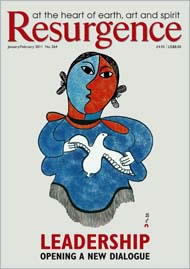The media sound bite goes like this: “Ellen MacArthur, 34, champion sailor famed for her record-breaking solo round-the-world journeys, gives up competitive sailing to save the planet.” And this book recounts that transformation with the detail, depth, passion and clarity it deserves. For those who only know of Ellen through her sailing exploits, this long, reflective book rounds out the picture of an extraordinary personality with a significant message: that the most important challenge a person can take on is that of changing her mind.
I’m not a sailor; I can’t even swim, and I stand in awe of Ellen’s voyages and her phenomenal success. There is plenty in the book about her early love of boats, her supportive family, her steely determination to learn to sail, her focus and drive to win races in the face of tremendous odds. There’s a glossary of sailing terms and photographs of her various boats to help the non-expert understand the vividly written sailing sections and you sense she is reliving the journeys as she writes.
It is, however, Ellen’s personal trans-formation that is the most compelling narrative thread. As an educator who has spent many years thinking about and attempting to convey the idea of ‘sustainability’, I identified with Ellen’s frustration as she too became aware of the concept but struggled to express it. In public, she was lamely advising audiences to ‘use less’, which she knew was coming across as a real turn-off. She realised then that she was conveying fear, not hope.
As I was reading her book, Stephan Harding’s Animate Earth was also at my side and I realised Ellen had actually gone through the three stages outlined by Arne Naess in Deep Ecology and described by Harding: deep experience, leading to deep questioning, leading to deep commitment. How did she come to that deep experience? By stopping!
On a camping trip to the remote islands of South Georgia in the Antarctic, she had time to sit and think. She saw old whaling stations reduced to a collection of rusting boats and abandoned buildings, and realised that what humans do is find a resource, take it, make things with it, create waste and move on. Fossil oil came on stream just as the great whales, once so plentiful, were close to extinction; and even with their hunting now so drastically reduced, Ellen had seen no whales at all in the Southern Ocean.
What also moved her were the albatrosses who kept her company as she absorbed the peace and tranquillity of these wild and beautiful islands. Her interactions with one young male – the haunting photograph shows the bird’s unbearably intelligent and poignant gaze – and her awareness of the precariousness of his existence are the ‘deep experience’ that precedes the deep questioning Ellen goes through on her return home. She muses on “how spectacularly we can miss the point. How we as a species can not only watch a resource deplete before our eyes, but then quite simply walk away, and move on to the next one.” A sailor has to manage a small number of finite resources until her voyage ends and she is able to refuel and restock: but there is no such refuelling station for the Earth.
Exploring the idea of living within planetary limits, she began to wonder: “Why had I, together with every other child of my generation, not been taught this at school?” How could she use her proven leadership qualities to frame these new insights in a way that would be inspiring and positive?
A timely meeting with Ken Webster, co-author of Sense and Sustainability: Educating for a Low Carbon World, supplied the focus she required. First, she needed to rediscover her optimism; and second, she needed to understand the basic rules of life: the world is “an intricate web of systems”, where resources are actually abundant when used according to the rule that waste from one process is food for another.
This ‘closed-loop’ system has been truly sustainable for millions of years. So don’t tinker with the broken old linear ‘take-make-dispose’ system, but “adopt the rules which have been proven to work for millennia”. No longer a ‘no more’ solution, but a ‘do more’ solution: with the closed-loop model, things are “made to be made again”.
Ellen’s deep commitment to this energising vision is embodied in her new Foundation, set up to “ensure that the next generation has the necessary skills to rethink, redesign and ultimately rebuild our sustainable future”. She now has a new vessel, and a brilliant star to steer her by.
It will be the greatest voyage of her life.
For further information visit: www.ellenmacarthurfoundation.org







